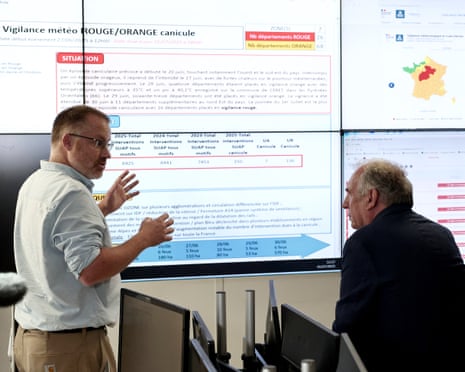French prime minister attends crisis meeting over heatwave
Angelique Chrisafis
The French prime minister François Bayrou, who attended a government crisis meeting over the heatwave, was asked about the great difficulty of French schools to handle the heatwave.

More than 1,350 schools across France were fully or partially closed on Tuesday as classrooms proved dangerously hot for children and teachers, amid anger from teaching unions.
In Paris, which was on maximum heatwave alert, parents were advised to keep their children home on Tuesday and Wednesday. Some other towns closed all their schools, such as Troyes and Melun.
Bayrou said the education ministry would open talks with mayors on how to adapt school buildings, most of which are extremely poorly insulated.
Amid soaring temperatures on Tuesday, some Paris teachers had nothing more than a water spray on their desk to repeatedly spritz children in classrooms in the hope of keeping cool.
Key events
Portugal recorded highest ever June temperature of 46.6C
Portugal recorded its highest-ever June temperature of 46.6C on Sunday, the national weather service said, reported by AFP.
The scorching high was registered at Mora about 100 kilometres (60 miles) east of Lisbon.
The previous June high of 44.9C was recorded in 2017 in the southwestern town of Alcacer do Sal.
The weather service added that 37% of its monitoring stations recorded temperatures higher than 40C on Sunday.
Spanish authorities are investigating whether a street sweeper’s death over the weekend in Barcelona was caused by an intense heatwave gripping the country and region, the city council said, reported by Reuters.
The woman, who had been cleaning the old town in Barcelona on Saturday afternoon, died later that day at home, her sister told the Antena 3 TV station.
Reuters reported that her sister said the 51-year-old woman, identified just as Montserrat, had told a colleague she thought she “was dying”.
Temperatures reached 30.4C (86.7F) in Barcelona on Saturday, weather agency AEMET said.
Reuters noted that extreme heat can kill by causing heatstroke, or aggravating cardiovascular and respiratory diseases, with older people being among the most vulnerable.
The city council said on Monday it would investigate the woman’s death.
Greece not seeing mercury hit record highs this heatwave

Helena Smith
in Athens
But while western and central Europe sizzle, Greece is not seeing the mercury hit record highs – even if it’s still very hot.
After high temperatures nudging 40 Celsius over the weekend, north westerly winds have brought much-needed respite to Athens.
Though, at 38C, temperatures have risen slightly again today and tavernas and eateries in the ancient Plaka district had fans on full blast, tourists were relieved that at least they were not experiencing the sort of heat recorded in Portugal.
“It’s great that it’s windy,” said Noelia sitting with her partner Pablo under the shade of mulberry trees and a giant palm.
“We’re from Asturias in northern Spain and we’re not used to such heat. We’ve heard that by the time we go back on Wednesday its going to be raining there and we’re happy!”
Greek authorities were forced to open air-conditioned facilities for elderly and vulnerable as the mercury climbed over the weekend. People were also banned from working outdoors.
Civil protection officials say their greatest fear is wildfires with fire fighting services placed on alert.
June 2025 ‘smashed records’ on temperature, Spanish meteo agency says
Sam Jones
still waiting for his delayed train in Seville
The Spanish state meteorological agency, Aemet, said in a social media update that “June 2025 smashed records” when it comes to high temperature, with an average temperature of 23.6 Celsius, 0.8 Celsius above the previous hottest June in 2017.
The monthly average was also 3.5 Celsius higher than the average over the period from 1991 to 2020, it said.
The agency’s comments come just days after Spain’s highest ever June temperature of 46 Celsius was recorded in the Huelva province of Andalucía.

Jakub Krupa
Let’s now check for the latest on extreme weather warnings across the continent and how countries are dealing with the heat.
Poland’s Tusk criticises Germany’s migration policy shift, reintroduces border controls

Jakub Krupa
Here’s more from Poland’s prime minister Donald Tusk on the decision to introduce temporary border controls with Germany and Lithuania, effective from 7 July.
The decision was made after a government meeting this morning with the Polish Border Guard, which requested the measure in response to significant protests at Poland’s borders over the weekend.
In his remarks at the beginning of the weekly cabinet meeting, Tusk blamed Germany for the move.
He said “the way operations are conducted at the Polish-German border has clearly changed over the past month,” as Germany “has effectively begun refusing entry to migrants who are heading to Germany to apply for asylum or other forms of protection.”
He argued that the recent policy shift – combined with unilateral border controls with all neighbouring countried introduced by Germany – has placed undue pressure on Poland to accept individuals denied entry at the German border.
“This new approach is problematic: with no border checks on the Polish side, it becomes increasingly difficult to determine whether those being returned or redirected to Poland are in fact subject to such procedures,” he said.
Tusk added that he had spoken “several times” with Germany’s Merz, warning him that Poland’s “patient stance … was wearing thin.”
“We have been defenders of the Schengen Area and remain advocates of a Europe with open borders and unrestricted movement. However, such a system requires equal and symmetrical commitment from all neighboring countries.
Therefore, the temporary reinstatement of border controls on the Polish-German border is necessary to reduce, to the minimum, the uncontrolled flow of migrants crossing … the border.”
Tusk added that “the task of the Border Guard is to … block any unjustified or unauthorized returns of migrants by the German side if they happened,” and “in order to gain control over this process, border checks must be reinstated.” “There is no other way,” he said.
Tusk also pointedly warned Merz that if German government extends one-sided border controls in September, “contrary to the spirit of the Schengen Code and EU law,” Poland would retaliate with a similar move.
The time when Poland would not respond appropriately to such actions has definitively come to an end.
The Polish PM added that the move to introduce temporary border controls with Lithuania was directly linked to the German policy change.
He argued that with the Polish-Belarusian heavily militarised border fully closed to irregular migration, other neighbouring countries, Latvia and Lithuania, are now being used to explore alternative routes for irregular migration, entering the Schengen area through the Baltics.
As a result, he said, “the stream of illegal migration, orchestrated by Russia and Belarus, continues to flow through Belarus, Latvia, and Lithuania – and Poland, after all, has an open border with Lithuania.”
Tusk also said he would work more closely with the Baltics to push the EU to act more decisively “to obstruct or prevent the operations orchestrated by Putin and Lukashenko, involving the organization of illegal migration and large-scale trafficking” into the EU in a bid to destabilise the bloc.
Merz was earlier asked about Poland’s growing criticism during a joint press conference with his Luxembourgish counterpart.
Speaking just minutes before Tusk announced Poland’s decision, Merz said he was aware of Polish concerns and repeatedly spoke with the Polish prime minister in recent days, with interior ministers also holding “a long telephone conversation” last night.
But he insisted that there were “no returns from Germany to Poland of asylum seekers who had already arrived in Germany.”
Instead he appeared to suggest that Germany simply exercises its right to reject people at the border.
Merz also said the two countries “have a common problem that we want to solve together.”
The German chancellor also told the press conference that:
“We naturally want to preserve the Schengen area, but freedom of movement in the Schengen area will only work in the long term if it is not abused by those who promote irregular migration, in particular by smuggling migrants.”
Poland introduces temporary border controls with Germany, Lithuania from Monday

Jakub Krupa
We’re just getting fairly big news from Warsaw.
Polish prime minister Donald Tusk has just announced that Poland will introduce temporary border controls with Germany and Lithuania from Monday amid growing tensions over irregular migration.
More soon…
French prime minister attends crisis meeting over heatwave

Angelique Chrisafis
The French prime minister François Bayrou, who attended a government crisis meeting over the heatwave, was asked about the great difficulty of French schools to handle the heatwave.
More than 1,350 schools across France were fully or partially closed on Tuesday as classrooms proved dangerously hot for children and teachers, amid anger from teaching unions.
In Paris, which was on maximum heatwave alert, parents were advised to keep their children home on Tuesday and Wednesday. Some other towns closed all their schools, such as Troyes and Melun.
Bayrou said the education ministry would open talks with mayors on how to adapt school buildings, most of which are extremely poorly insulated.
Amid soaring temperatures on Tuesday, some Paris teachers had nothing more than a water spray on their desk to repeatedly spritz children in classrooms in the hope of keeping cool.
4.6 magnitued earthquake shakes area around Campi Flegrei supervolcano in Italy
Angela Giuffrida
Meanwhile in Italy, a 4.6 magnitude earthquake shook the area around the sprawling Campi Flegrei supervolcano in southern Italy on Monday.
The tremor, which was also felt in Naples, is the most powerful to affect the densely populated area in 40 years and was preceded in previous days by several smaller quakes. Trains were disrupted although damage from the quake, whose epicentre was close to the town of Bacoli, was minimal.
Seismic activity on Campi Flegrei, which is home to at least 360,000 people across seven of the most at-risk inhabited hubs, has intensified within the past three years, with the frequency and strength of the quakes increasing as the caldera, the basin at the top of the volcano, weakens and pressure beneath it builds. This causes the ground to rise and the volcano’s crust to stretch.
A small tremor in early June caused the partial collapse of a wall and a portion of a vault at the Pompeii archaeological site.
The Italian government has devised a mass evacuation plan, with test-runs held last year, Nello Musumeci, the minister for civil protection and sea policies, said on Monday that the problem was something the residents of Campi Flegrei “unfortunately have to live with”.
Brussels landmark closes early due to heatwave

Lisa O’Carroll
in Brussels
Temperatures in Brussels could hit 38 degrees celsius on Tuesday, the national weather forecasters have said as part of an orange weather warning.
The landmark Atomium monument, consisting of large metal spheres representing atoms, will be closed from 14.30 “due to the heat and the structural limitations of the building”, it said.
It is the first time it has been closed since 2019.
Travel disruption in Seville after overnight power failure
Sam Jones
in Seville
It’s already 34C in Seville this morning and the situation has been worsened for travellers by an overnight power failure that has severely affected service between Madrid and Andalucía.
The cause of the malfunction was unknown, a spokesperson for state-owned railway infrastructure operator ADIF told Reuters. The agency noted that a copper cable theft paralysed the same line for more than 12 hours in early May.
This is how things look as people wait for delayed trains at Santa Justa station.
A lot of blaring official convoys on the streets, too, as the great and the good make their way to the development financing summit here.
European heatwave – in pictures
Japan reports hottest June on record
It’s not only Europe: Japan experienced its hottest June on record, the weather agency said Tuesday, as climate change prompts sweltering heat waves across the globe, AFP reported.
“Japan’s monthly average temperature in June was the highest for the month since statistics began in 1898,” said the Japan Meteorological Agency.
The coastal water temperature near Japan also measured 1.2 degrees Celsius higher than usual, tying with June 2024 for the highest since data collection began in 1982, the agency said.
Many areas of southern, eastern England to see temperatures in 30s
More sweltering temperatures are also expected in southern and eastern parts of England on Tuesday, with many areas again passing above 30 Celsius with up to 36 Celsius expected locally, PA reported.
It comes after the UK Health Security Agency (UKHSA) extended amber heat health alerts for much of the country into Wednesday morning.
Monday saw the hottest start to Wimbledon on record, with 32.9C recorded at nearby Kew Gardens, while 33.1C was recorded at Heathrow.
Paris-Milan high speed line suspended after violent storms
Train travel between France and Italy is suspended for “at least several days” after violent storms earlier in the week, French national operator SNCF said, AFP reported.
The storms on Monday in southeastern France have forced a clean-up operation during which SNCF will check there has been no damage to tracks on the Paris-Milan high speed line which would prolong the closure, it said.
Italy adopts measures to deal with heat
In Italy, some regions, including Lazio and Lombardy, adopted new rules seeking to protect workers from record temperatures, requesting a halt to outdoor activities on construction sites and quarries during the hottest hours, according to national media. Other regions, like Emilia Romagna, are about to adopt similar measures this week.
Elsewhere, in Genoa, free travel hours for senior citizens were extended to start earlier and encourage them to travel early before temperatures rise, Corriere della Sera reports.
Bologna authorities reported a 7% increase in the number of emergency calls.
Morning opening: It’s hot (again)

Jakub Krupa
Large parts of Europe are on extreme weather warnings again this morning as the first European heatwave continues, once again raising questions over public health, environmental hazards, and the impact of climate change.
Paris (38C) is on the highest, red alert with the top of the Eiffel Tower closed to tourists as a precautionary measure. The country’s prime minister François Bayrou – who is separately facing a vote of no confidence today, which he is expected to survive – has cancelled his meetings to monitor the situation in real time.
Other cities across the continent will also see higher than usual temperatures, including Zaragoza (39C), Rome (37C), Madrid (37C), Athens (37C), Brussels (36C), Frankfurt am Main (36C), Tirana (35C), London (33C).
For some, it will be the peak of the heatwave; for others – it’s only the beginning.
I will bring you all the latest updates from across Europe here as the continent battles the heatwave.
It’s Tuesday, 1 July 2025, it’s Jakub Krupa here, and this is Europe Live.
Good morning.


